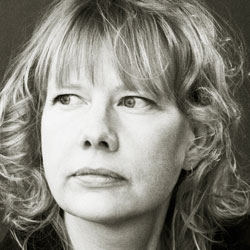Above, blue darkens as it thins to an airlessness wheeling
with sparkling American junk
and magnetic brains of astronauts. We are flung
across our seats like pelts.
Some of us are eating small sandwiches.
Some of us have taken pills and are swallowing
glass after glass of gin.
We were never intended to view the curve of the earth
so they give us televisions, a film
about a man and his daughter who teach a flock
of Canada geese to fly.
Wind shear hates the sky and everything in it,
slices at right angles across the grain of currents
like a cross-cut saw.
Fog loves surprises.
We have fuel, fire, Starbuck’s coffee, finite
possibilities of machinery. A pilot with human hands
and nothing for us to do, turbulence being to air
what hope is to breathing.
A property.
Far below, a light comes on in the kitchen of a farmyard
turning with its piece of the world into shadow.
Someone can’t sleep
an engine noise falls around the house like snow, vapour trails
pulled apart by frontal systems locked overhead
since high school. Imagines
alien weathers that unfurl in time zones
beyond the horizon.
Notes on the Poem
How do poets decide how to title their poems? And when do they settle on the titles ... before, during or after the poem is composed? Do you ever wonder about that as you're reading a poem? Karen Solie's "In-Flight Movie", from her 2001 collection "Short Haul Engine," is an intriguing piece to which these questions could be applied. Solie or her narrator in "In-Flight Movie" is clearly not a fan of travelling by air. From the first line, Solie builds a manic sense of someone both hyper aware of her simultaneously enclosed and unnervingly boundless surroundings, and also profoundly powerless and inert, as she and her fellow passengers are "flung / across our seats like pelts." Fear, nervousness, denial and attempts at distraction abound, from eating to pill-taking to imbibing. "We were never intended to view the curve of the earth" "Wind shear hates the sky and everything in it" and "Fog loves surprises" are especially terse declarations from someone who thinks this mode of travel is unnatural, and therefore is anticipating some form of mishap. But the title of the poem would suggest the focal point is the movie playing on this possibly ill-fated flight. Is the irony that the film is about "a man and his daughter who teach a flock / of Canada geese to fly", adding fuel to the narrator's tense litany of woe, that the airline would be that insensitive with already nervous passengers? Conversely, is Solie ruefully acknowledging that the uneasy traveller is finding the most tenuous of excuses - when, obviously, grievances about fuel, fire, machinery problems and the like are much more plausible - to be unhappy? Or is she deriving some desperate solace that anyone can be taught to fly in a pinch? Then again, perhaps the in-flight entertainment hasn't been the story about the Canada geese at all, but rather the wild imaginings of disaster. Finally, maybe it's the consoling view of a light on in a farmhouse kitchen, where someone can't sleep because, ironically, that person imagines and wishes she *was* on a plane.

This is a wonderful poem, but the commentary, presumably aimed to open it up, rather ruins the atmosphere. It seems to mistake the 1st person plural voice of the poem (we/us) for one person – the idea that there is one person who is ‘not fan of travelling by air’ illuminates nothing, and in fact would confuse most readers. I’m also not convinced that the sleepless person at the close wishes [she? how do we know it’s a she?] were on a plane – all we are shown is that they are imagining ‘alien weathers’. Not that they necessarily wish to be subject to them, or be on that flight. The film referred to must be ‘Fly Away Home’ http://en.wikipedia.org/wiki/Fly_Away_Home. It might be useful to note Solie chooses to reference a real film which is easily identified, and maybe question why. It is a bit of a leap to suggest a film about canada geese – which are meant to migrate – would give solace to a poet worried about human beings’ aptitude for flight. The idea of having commentaries is great – but they really need to be more insightful, or at least thorough, to do what you want them to do.
Polly, we’re pleased to receive your appreciation and analysis of this poem. It illustrates that everyone comes to a poem with different – sometimes divergent, sometimes surprisingly complementary – reactions and interpretations. Even if readers choose to disagree with our notes for starting the conversation, we’re glad that they add to the conversation! Thank you.